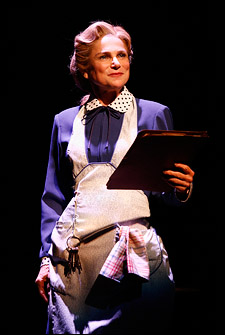
In her current role, the four-time Tony Award nominee is still in the saving business, but the number of the rescued are fewer, and the savior she's playing is not Jewish, but a Polish Catholic. Irena's Vow, which played at the Baruch Performing Arts Center in fall 2008, tells the real life story Irena Gut Opdyke, who was forced to work as head housekeeper for a high-ranking Nazi officer. Simultaneously, she hid and protected 12 Jewish refugees, who lived in the basement of the officer's home. When the officer found out, she became his mistress to buy his silence. Feldshuh talked to Playbill.com about her latest foray into historical and political theatre.
Playbill.com: How did you become involved in the project?
Tovah Feldshuh: Irena's Vow came to me on a platter of love. My dear friend John Stanisci, who is in the play, and Thomas Ryan, who's also in the play, came to me and said, “We've got a part for you in a play." And I said, "I love you dearly. You are my friend. Do not foist upon me yet another Jewish mother." (Laughs) He said, "It's a little close to your subject matter, but she's absolutely not Jewish. This is a Polish Catholic blonde." My ears perked up. I read it. I said. "I don't know if I can commit to doing the play." He said, "We really need you for readings. Maybe we can raise money if you do the readings." Boy, did it. My friend Stan Raiff came to one of the readings and plopped down the capitalization for an Off-Broadway show. Then my friend, Daryl Roth, came at the request of myself.
Playbill.com: Were you at all familiar with Irena Gut's story?
TF: Absolutely no. Never heard of her. I read the script and the part was terrific. [Playwright] Dan Gordon told me the story, which I had since forgotten, that the part was split in two. And I said, "I'm not going to do a reading just playing the old gal. Are you kidding me? It's a waste of my time."
Playbill.com: So there was a young Irena part and an old Irena part?
TF: Yeah. I said, "As much as I love you, I ain't showing up for a supporting role." So Dan made that decision. He changed it and it worked. And then it was good for everybody, and certainly great for me. It's great for the producer pocketbook; it cuts down on a salary. It makes two very nice parts an extraordinary role.
Playbill.com: What parts of Irena Gut's life does the play cover, just the World War II years or more?
TF: No, more. From age 17 to 72. It starts with what happened after World War II. It starts with her talking to a class because she can no longer be silent. She returns completely to her youth. However, all the monologues during the play are in memory, so, when I speak to you, even though my hair is down, my body changes, I become older, wiser, stiller as the older Irena.
| |
 |
|
| Tovah Feldshuh in Irena's Vow | ||
| photo by Carol Rosegg |
TF: She slept with a German officer. "Love is strong, hate is strong, trust is fragile."
Playbill.com: She must have been quite good-looking. From what I've read, every SS officer seemed to want her to become their mistress.
TF: You know, you and I think alike. She was very beautiful, but she also must have been one of those estrogen-oriented, slightly glam gals. I'm a tom boy, I based my life on my father. I love being a girl, but I'm not always a girly-girl. Irena's a girly-girl. She employs such an interesting part of myself, I always enjoy it. I always pretend I'm in an organdy party dress half the time, or something beautiful. She's the delicate little fawn with great intuitive intelligence.
Playbill.com: Many of your theatre projects deal with Jewish subject matter and feature Jewish characters. How important is that to you that your projects have that aspect?
TF: I'm interested in doing good projects. But I think, because people have busy lives, shorthand is a useful tool for everybody. Shakespeare says, "What's in a name?" I say, "Yes, but you must put the effort forth." It is much easier for me to be handed, without audition, the mini-series "Holocaust," or Golda's Balcony, than for me to be handed Love Letters, which I had trouble getting an audition for in New York, I'm sad to say. And I'm sad for the production, because how many other capable performers were passed over because the name didn't sound right?
Playbill.com: So you're saying your resume has as much to do with serendipity and other people's perceptions than it does with your personal convictions about the kind of projects you want to do.
TF: My name was perceived, at first, when I was completely unknown — people wondered if I was foreign or from another country. I believe I've been fortunate enough to be offered projects that sometimes have to do with Jewish ethnicity and history that are the cream of the cream of those projects. The top. You don't see me showing up for those I don't consider of the highest rank. Let's be frank here. I absolutely love being an American, and I'm proud to be an American Jew. I have no bones about it. But as an artist, you want to be able to play everything.










